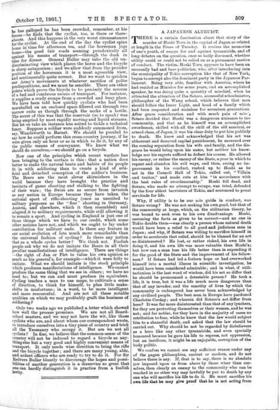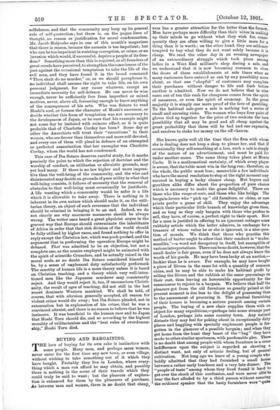A JAPANESE ALTRUIST.
THERE is a certain fascination about that story of the murder of Hoshi Torn in the capital of Japan as related at length in the Times of Tuesday. It revives the memories of one's youth, of essays for and against tyrannicide, and of long debates on the question, once so hotly discussed, whether utility could or could not be relied on as a permanent motive of conduct. The victim, Hoshi Torn, appears to have been an unusually bad and base•politician, who, after introducing into the municipality of Tokio corruption like that of New York, began to corrupt also the dominant party in the Japanese Par- liament. Being very able, familiar with America, where he had resided as Minister for some years, and an accomplished speaker, he was doing quite a quantity of mischief, when he attracted the attention of Iba Sotaro, successful schoolmaster, philosopher of the Wang school, which believes that men should follow the Inner Light, and head of a family which had been respected and stainless for seventeen generations: After grave consideration and with much pain of min', Sotaro decided that Hoshi was a dangerous nuisance to the community, and that as he himself was an accomplished swordsman, skilled with all the skill of the old samurai, or armed class, of Japan, it was his clear duty to put him publicly to death. He knew and acknowledged that his act was abhorrent and deserved capital punishment, he mourned over the coining separation from his wife and family, and the dis- grace he would bring upon his name, but neither his know- ledge nor his regrets sufficed to deflect his course. He allowed his enemy, or rather the enemy of the State, a year in which to repent and abandon his evil ways, and then, seeing no im- provement in his conduct, rushed up to Hoshi as he sat in the Council Hall of Tokio, called out, " Villain and traitor," and made cuts at him " in accordance with the best rules of swordsmanship." Hoshi fell dead, and Sotaro, who made no attempt to escape, was tried, defended by the four ablest barristers of Tokio, and sentenced to penal servitude for life.
Why, if utility is to be our sole guide in conduct, was Sotaro wrong ? He was not seeking his own good, but that of the community at large, which, on the utilitarian theory, he was bound to seek even to his own disadvantage. Hoshi, assuming the facts as given to be correct—and no one in Tokio doubts them—was clearly a person whose natural death would have been a relief to all good and judicious men in Japan; and why, if Sotaro was willing to sacrifice himself in order to accelerate that relief, should he be blamed for an act so disinterested ? He lost, or rather risked, his own life in doing it, and his own life was more valuable than Hoshi's; but how can a man lose his life better than in expending it for the good of the State and the improvement of his fellow- men ? If Sotaro had led a forlorn hope or had overworked himself into a mortal illness in scientific investigation, he would have been considered admirable ; and in what, if utili- tarianism is the last word of wisdom, did his act so differ that he should be pronounced a detestable person? He took a life, it is true, but it was a life much more dangerous than that of any invader, and the sanctity of lives by which the community is endangered has never been acknowledged by any civilised people. The best men in Europe have pardoned Charlotte Corday; and wherein did Sotaro's act differ from hers? It was far more disinterested than that of any lynchers, for they are protecting themselves or their women, and he was not; and far nobler, for they have in the majority of cases no retribution to fear, while he knew that the law would subject him to a shameful death, and asked that the law should be carried out. Why should he not be regarded by disbelievers as a hero like any other tyrannicide, and even specially honoured because he gave his life to repress, not oppression, but an insidious, it might be an enjoyable, corruption of the body politic.
We confess we cannot see any sufficient reason under any of the pagan philosophies, ancient or modern, and do not believe there is any. If, that is to say, there is no absolute law imposed upon us from above by those wiser than our- selves, then clearly an enemy to the community who can lie reached in no other way may lawfully be put to death by any one who will sacrifice his life to do it. He must sacrifice his own life that he may give proof that he is not acting from
selfishness, and that the community may keep up its general rule of self-protection; but there is, on the pagan lines of thought, no reason or justification for moral condemnation.
Mr. Jacob Holyoake says in one of this month's magazines that there is reason, because the assassin is too impatient; but
who can be too impatient in resisting corruption, or crime, or an invasion which would, if successful, deprive a people of its free- dom? Something more than this is required, as all founders of great creeds have perceived, to strengthen the consciences of the just against the occasional temptation to take the life of the evil man, and they have found it in the broad command " Thou shalt do no murder," or, as we should paraphrase it, no individual shall assume the right to take life, on his own personal judgment, for any cause whatever, except an immediate necessity for sell-defence. He can never be wise enough, never be sufficiently free from imperfect or mixed motives, never, above all, foreseeing enough to know anything of the consequences of his acts. Who was Sotaro to read Hoshi's soul, or foresee the character of Hoshi's successor, or decide whether this form of temptation was not necessary to the development of Japan, or be sure that his example might not some day be imitated with ruinous effect, as it is quite probable that of Charlotte Corday has been? Some day or other the Anarchists will trust their " executions " to their women, who are fiercer than themselves and more self-devoted, and every one of them will plead in defence of an attempted or perfected assassination that her exemplar was Charlotte. Corday, whom the world has not condemned.
This case of Iba Sotaro deserves careful study, for it marks precisely the point to which the rejection of doctrine and the worship of conduct, on utilitarian or altruistic grounds, may yet lead many. If there is no law higher and more impera- tive than the well-being of the community, and the wise and disinterested may decide on grounds of pure utility in what that well-being consists, it follows of necessity that the removal of obstacles to that well-being must occasionally be justifiable. A life wanting which a community would be safer is a life which it is allowable to take away. There is nothing in it inherent in its own nature which should make it, on the utili- tarian theory, an object of such reverence that the individual should be criminal in bringing it to an end. Indeed, we do not clearly see why enormous massacres should be always wrong. The writer once heard a great physicist argue in the gravest way that Europe should exterminate the inhabitants of Africa in order that that rich division of the world should be fully utilised by higher races, and found nothing to offer in reply except the Christian law, which was pooh-poohed, and the argument that in performing the operation Europe might be debased. That was admitted to be an objection, but not a complete one, as the armies employed might be animated with the spirit of scientific Crasaders, and be actually raised in the moral scale, as no doubt lba Sotaro considered himself to be, by a sense of unpleasant duty satisfactorily performed. The sanctity of human life is a mere theory unless it is based on Christian teaching, and a theory which very well-inten- tioned men like the Japanese murderer may consistently reject. And they would reject it, too, if unconscious Christi- anity, the result of ages of teaching, did not still in the last resort dominate Western mankind. We shall be told, of course, that with altruism generally accepted, all reason for violent crime would die away; but Iba Sotaro pleaded, not in extenuation but in explanation of his crime, that he was a convinced altruist, and there is no reason to believe that he was insincere. It was beneficial to the human race and to Japan that Hoshi Torn should die, and so according to the highest morality of utilitarianism and the " best rules of swordsman- ship," Hoshi Torn died.















































 Previous page
Previous page